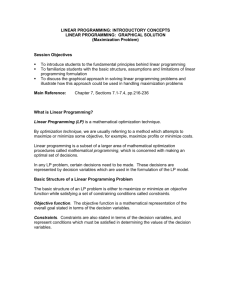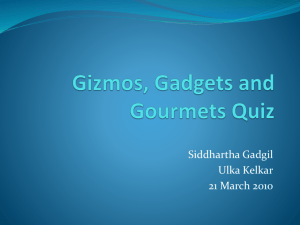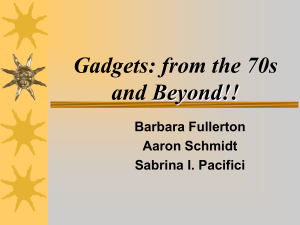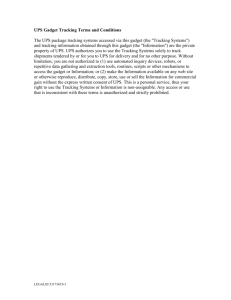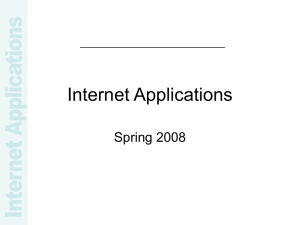Slides
advertisement
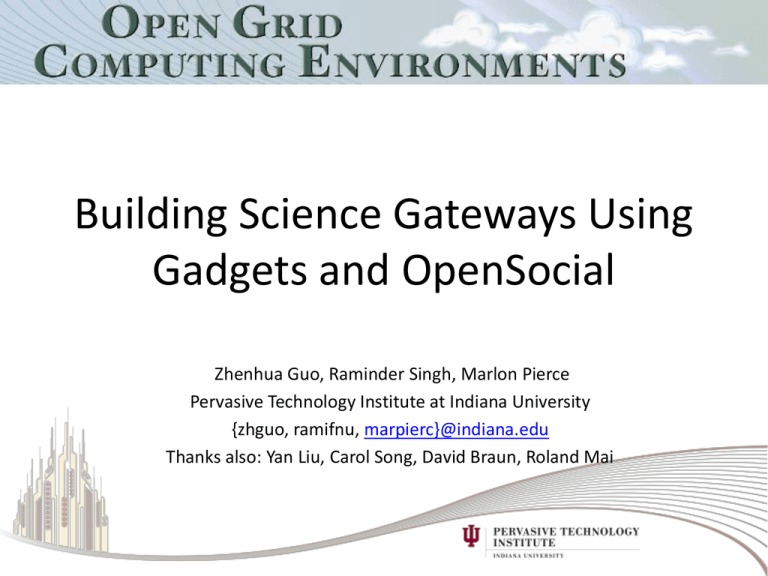
Building Science Gateways Using
Gadgets and OpenSocial
Zhenhua Guo, Raminder Singh, Marlon Pierce
Pervasive Technology Institute at Indiana University
{zhguo, ramifnu, marpierc}@indiana.edu
Thanks also: Yan Liu, Carol Song, David Braun, Roland Mai
What Is a Science Gateway?
• A Science Gateway is a Web-based environment for accessing
supercomputers, mass storage systems, scientific instruments, data
collections, and other scientific resources.
• Most gateways are user interfaces to scientific applications and data
sets
– Computational chemistry, climate modeling, weather modeling, drug
discovery, gene sequencing, etc.
• In US, gateways primarily associated with the NSF TeraGrid Science
Gateway program.
– List of gateways: https://www.teragrid.org/web/sciencegateways/gateway_list
– Nancy Wilkins-Diehr directs this effort
• Example European activities:
http://agenda.ct.infn.it/conferenceDisplay.py?confId=347
UC TeraGrid Gadgets
Courtesy Tom Uram, University of Chicago
Purdue TeraGrid Gadgets
SimpleGrid Gadgets
Yan Liu, UIUC
About OGCE
http://www.collab-ogce.org
http://collab-ogce.blogspot.com
http://twitter.com/ogceproject
Open Gateway Computing
Environments
• The OGCE team develops software for building
secure, Web-based Science Gateways
– Chemistry, Bioinformatics, Biophysics,
Environmental Sciences
• OGCE is funded by the National Science
Foundation’s Software Development for
Cyberinfrastructure (SDCI) program.
OGCE Software
Name
Description
OGCE Gadget
Container
An OpenSocial and Google gadget-compatible
Web container for running Web gadgets.
GFAC
A Web service for generating, securely invoking,
and managing the lifecycle of scientific
applications on Grids and Clouds
Composer (XBaya), enactment engines, event
system, and service registry to support scientific
workflows on Grids and Clouds.
Tools for building secure Google-gadget based
Science Gateways.
Workflow Tools
Gadgets and
Gadget Building
Tools
Google Gadget-Based Science Gateways
PolarGrid
MyOSG
LEAD
The OGCE Gadget Container allows you to build portals out of
public and private Google Open Social gadgets. Supports HTTPS.
Downloadable, packaged software.
Users can switch between tabbed view (default) and tree view (shown)
Layouts can be two or three columns. Color schemes can be dynamically
changed. Layouts are encoded in JSON, can be edited directly, can be accessed
by REST API.
The OGCE Application Registry gadget allows users to interactively
register hosts and applications that are dynamically wrapped as
Web services. Default canvas view.
The OGCE Experiment Builder gadget allows users to
create projects and experiments out of previously
composed workflows.
Mobile Support
Gadget Container is
built with HTML,
JavaScript and CSS.
Works in both iPhone
and Android native
browsers with out
modification.
Developing layout
managers better suited
to limited screen real
estate.
OGCE Gadget Container Details
Why a Gadget Container?
• TeraGrid community diversifying beyond Java portlets.
– Need a common component model
– Gadgets provide a more flexible development environment.
• We wanted to develop portal software for Science Gateway
gadgets.
– Build on top of Shindig 2.0 for gadget rendering, social networking
– Add layout, look-and-feel support, identify management,
administration
– Provide extended REST APIs: layouts, login, sign-up, etc
• Meet Gateway requirements for security
– End-to-end HTTPS, including remotely running “url” gadgets
– X509 credential passing: in-memory and via REST to remote services
• Simplify configuration, build, and deployment down to 1-2 steps
• Open Source for supporting contributions and collaborations.
Feature Groups
Features
Look and Feel
Tabbed and Tree layout managers, 2 and 3 column
layouts, default maximized views of gadgets, customizable
color styling.
Supports end-to-end SSL between browser, container, and
gadgets; OpenID authentation; OAuth-secured gadgets;
MyProxy logins; limited Grid credential sharing between
gadgets; CILogon for InCommon login
Supports OpenAjax publish-subscribe style messaging
between gadgets. Investigating PMRPC
Security
Inter-Gadget
Communication
REST Service API
Layouts, logins, sign-ups, user administration, user
identification, and Grid credentials all accessible via REST
service calls as well as the user interface.
Open Source Social All code is open source and builds on Apache Shindig 2.0.
Networking
Example Gadgets
Filter Gadget
User can select different parameters to run a filter to create
image. Result image will be displayed on Google map.
Blog Gadget
To display Atom feeds from blog sites.
Picasa Gadget
Picasa gadget to display all the filter images with filter
description.
Discussion Board
Google Friend Connect (GFC) gadget to discuss on certain topic.
FAQ Gadget
GFC gadget for Question/Answer. Moderator can always control
the topics and can block people from the list.
Google Calendar
Calendar gadget to display public PolarGrid-specific activities and
tasks.
Twitter Gadget
To read filter execution updates from twitter feeds.
Facebook Gadget
User can update status of task directly to Facebook from here.
Gateway Gadgets
Gadgets for registering applications, browsing workflows
General rule: don’t reinvent existing services.
Implementation Details
• Gadget container server side implemented as Java web application.
– Peer webapp to Shindig in the same Tomcat server. Our Maven
installation process overrides ROOT with Shindig 2.0.
– We don’t touch Shindig code except to customize configuration.
• Needed to enable OAuth, for example:
http://cglreport.zhenhua.info/2010/09/oauth-in-ogce-gadget-container.html
– HTTPS authentication configured (including key generation in our build
phase)
• Client side built with Ext-JS JavaScript, OpenAJAX Hub libraries.
• Gadgets are rendered with Shindig; we embed them as IFrames.
• JAAS for login module.
– We currently manage the user profiles ourselves.
• GWT, YUI-based gadget support in progress
– YUI: must tweak the YUI “make request” function.
– GWT: CSS and JavaScript relative paths not handled correctly (“same
origin” problems)
Shindig Issues
• Need to understand impact of HTML5 and related stuff
– Web messaging, drag and drop, client-side storage
• Collaborators like to use their own JavaScript libraries,
frameworks (YUI, GWT, PMRPC, jQuery, …) instead of
OpenSocial Gadget libraries
– Will have SOP problems when making AJAX calls, etc.
• Many nice gadgets in iGoogle use non-standard or
proprietary tags
– Google Viz, Charts, etc.
• Most gadgets are toys. No good Google docs, spreadsheet
integration with gadgets.
– To survive, OpenSocial needs a set of high quality, open source,
portable, sustainable productivity, content management,
document management, and related tools.
More Information
• Demo Movies: See http://www.collabogce.org/ogce/index.php/Main_Page#What_Does_It_Do.3
F
• OGCE Web Site: http://www.collab-ogce.org
• News Feed/Blog: http://collab-ogce.blogspot.com
• Contact us:
– ogce-discuss@googlegroups.com
– http://groups.google.com/group/ogce-discuss/
• Software Downloads: Software is available as tagged SVN
releases from our SourceForge project.
– http://sourceforge.net/projects/ogce/
– See http://www.collabogce.org/ogce/index.php/Portal_download
Additional Slides
Future Directions
• Better integration between our user management
system and Shindig
– Implement and expose OpenSocial REST APIs (Person,
Activity, AppData)
• Better administration interfaces
• Better mobile device-compatible layouts
– But remain browser-based.
• Distributed security with REST, OAuth
– Identity confirmation, profile services
– Delegated X509 Credentials
• General trend: the Gadget Container becomes less and
less visible, more of a backend service.
OGCE Gadget Portal Features
•
Two layouts
– Tab
– Tree
•
•
•
Gadget group manipulation – add/remove
Four built-in themes
Gadget manipulation
–
–
–
–
•
•
Add/remove Gadget
Drag and Drop
Two gadget views: home and canvas
Gadget setting
Session persistence
Layout data
– View, modify layout data
– Easy to migrate when you do a new installation
– Inspect
•
•
On demand rendering
Customization
OGCE Gadget Portal
• Goal
– Build an open, lightweight, flexible, easy-to-build,
general portal
• Approach
– Agile development: make use of existing and
widely-accepted technologies and services.
• Web 2.0, Gadget, OpenSocial, OpenID, OAuth
• Google Calendar, Picasa, Blogspot, Twitter
• TeraGrid services, Open Life Science Gateway services
Other Science Use Cases
• TeraGrid
– MiniGpir, load monitoring, resource usage
• Open Life Science Gateway
– Use OAuth to submit jobs and access resources
• Cyberaide
– Interact with Grid using web interface
• MyProxy authentication
• Globus Job Submission
• GridFTP file transfer
Teragrid Gadgets
OGCE Software’s and Related links
OGCE Layout Manager: This project is to provide Open Social-compatible gadget layout container
and gadget host server.
– Actively Developed by Gerald Guo, PHD student in Indiana University
– Gadget Develops need not to depend on igoogle or orkut
– Lot of new feature are added lately and several new in a queue.
GFAC: Wrap any command-line application as an Webservice.
– Developed for Lead Project and now generalized for any gateway.
– Rearchitected to work as Axis 2 service to leverage handler architecture and REST
support.
Publications and related research
•
•
•
•
•
Building the PolarGrid Portal Using Web 2.0 and OpenSocial GCE09 Grid Computing
Environments 2009 workshop at SC09 Portland Oregon November 20 2009
http://www.collab-ogce.org
http://collab-ogce.blogspot.com/
http://cglreport.zhenhua.info/
http://communitygrids-raman.blogspot.com/2009/07/open-social-frameworks_20.html
Introduction to Polargrid
•
•
•
•
An NSF-funded MRI project that provides computing support for the Center
for the Remote Sensing of Ice Sheets (CReSIS, https://www.cresis.ku.edu/)
CReSIS is primarily concerned with using Synthetic Aperture Radar (SAR)
techniques to obtain information on the depth of the Greenland and Antarctic
ice sheets and their underlying rock beds.
Provides both in-the-field computing clusters for initial image processing and
larger clusters at Indiana University for full-scale image processing.
Image processing is needed to produce data products of multiple levels
Partners & Collaborators
• Jeff Woods at ECSU
• University of Kansas
• Ohio State University
• Pennsylvania State University
Portal Requirements
• View CReSIS data sets, run filters, and view results
through Web map interfaces.
• See/Share user’s events in a Calendar.
• Update results to a common repository with
appropriate access controls.
• Post the status of computational experiments.
• Support collaboration and information exchange by
interfacing to blogs and discussion area.
Approaches
• Existing frameworks like Sakai, Moodle,
Liferay, Exo and Drupal
• Building open system using OpenSocial
Gadget and using Google services or social
network services like Facebook, Twitter etc.
for collaboration
Polargrid Architecture
Backend services
• REST service
a. To integrate gadget with GFAC service.
b. Call GFAC Webservice and read the SOAP response to read result.
c. Upload resultant image to Picasa with parameters information.
d. Add this activity to the calendar under particulate calendar name.
e. Publish this activity along with Picasa URL and Calendar event to
Twitter
f. Create JSON response for Gadget
• GFAC Service is to wrap the service request and establish
communication with Teragrid resources to run the Matlab job.
• Matlab filter: Binary takes all the parameters and process the filters for
required data set.
PolarGrid Architecture
PolarGrid specific
gadgets and services
Generic services
REST
•
•
•
•
•
•
Uniform interfaces based on HTTP
Resource-oriented (resource can be anything)
Each resource is identified by a unique URL
State transition (Link resources together)
Resources have multiple representations (JSON,XML)
Good for both browser-to-server and server-to-server
interactions
• Alternative - SOAP-based WS
– About 60 core ws-* protocols
– Designed for server-server interactions
• SOAP and WSDL are really complicated
• Browser-based apps are second-class citizens.
Gadget Resource
• Reusability
• Google gadget directory contains about
180,000 gadgets.
• They can be deployed to OGCE gadget portal.
• Common gadgets
– RSS Feed Reader, Calendar, Email, Task list
• Social gadgets
– Twitter, Google Talk, Facebook, Youtube
Google Friend Connect
• Novel way to integrate Social Features
• Allow users to login with existing Google, Yahoo, AOL, OpenID accounts
OAuth (cont.)
• Drawbacks
– V1.0 is vulnerable to session fixation attack
(http://oauth.net/advisories/2009-1). Fixed in v1.0a.
– Delegation granularity (Service provider-specific)
• Operations
• Data
– Access token management
• Non-standard
• Expiration (implicit timeout)
• Revocation (explicitly revoke assigned privileges)
OAuth
• Users’ data is served at service providers.
• Third party apps want to access users’ data.
• Users don’t need to relinquish username and
password to third party apps.
3rd-party App
Twitter
Google Docs
MySpace
Twitter
SmugMug
OpenID
• Separation of Identity Provider and Relying Parties.
Google Blogspot
Yahoo!
Flickr
AOL
•
•
•
•
OGCE Gadget Portal
Identity Providers: Blogspot, Flickr,
Use the same OpenID to log in multiple sites.
Bind OpenID to local accounts.
After the binding, use OpenID for login.
OpenSocial
• A coherent open architecture designed for social network services
and applications.
Components
• Interface :
REST, Javascript APIs
• Client : Ajax, Gadget
• Message Format :
JSON, XML
• Security : OAuth
• Data Model
Polargrid Discussion Board Gadget
OGCE Funds Full Gateway Software Lifecyle
OGCE Partners and People
Institution
Indiana
University
People
Marlon Pierce, Suresh Marru, Raminder
Singh, Archit Kulshrestha, Gerald Guo
NCSA/UIUC
Sudhakar Pamidighantam, Shaowen Wang,
Yan Liu
Carol Song, Lan Zhao, David Braun, Shawn
Wu
Emre Brookes, Borries Demeler, Bruce
Dubbs
Purdue
University
UTHSCSA
![[#BAM-1384] Error was thrown when creating gadget in](http://s3.studylib.net/store/data/008624423_1-6f089c8fcdd44b7b0c03215bf260bf0e-300x300.png)
